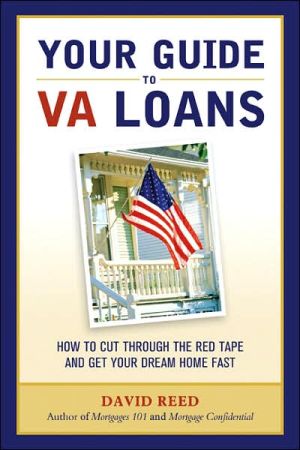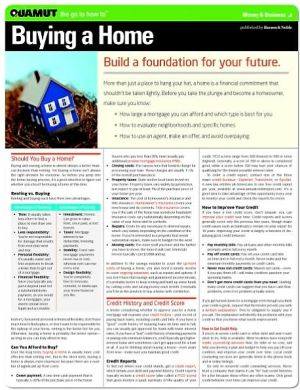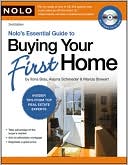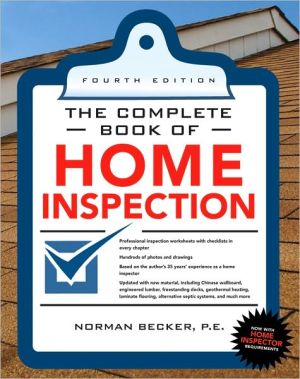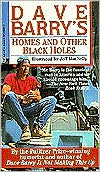Your Guide to VA Loans: How to Cut Through the Red Tape and Get Your Dream Home Fast
In 1944, Congress enacted the GI Bill to thank the men and women who served in the armed forces for their hard work and dedication. One of the most valuable benefits included in the bill was the VA Loan. But bureaucracy and stringent procedures have made applying and qualifying for these loans complicated and unwieldy. Your Guide to VA Loans is the first book to guide veterans through the process. Readers will discover how to determine whether VA loans are right for them, how to apply, and...
Search in google:
In 1944, Congress enacted the GI Bill to thank the men and women who served in the armed forces for their hard work and dedication. One of the most valuable benefits included in the bill was the VA Loan. But bureaucracy and stringent procedures have made applying and qualifying for these loans complicated and unwieldy. Your Guide to VA Loans is the first book to guide veterans through the process. Readers will discover how to determine whether VA loans are right for them, how to apply, and how to deal with common problems that arise. Mortgage expert and author David Reed has more than 30 years of experience helping buyers navigate complicated loan processes. Here he offers advice on topics such as:• selecting the right VA lender• finding an agent in a town where there are few veterans• getting the best interest rate• refinancing VA loans• getting advice on VA loans while on active dutyComplete with a guide to regional resource centers, sample loan applications, payment tables and a glossary of terms, this seminal guide will help all veterans fully enjoy the benefits they need and so richly deserve.
C H A P T E R 1\ Getting Started\ What is a VA loan? First and foremost, it’s an entitlement. An entitlement is something that is owed to you by someone else. And you earned it. Way back in 1944, Congress enacted the GI Bill, which authorized the creation and funding of various ‘‘thank yous’’ to the nation’s veterans in the form of health benefits, free education, and housing assistance.\ What better way to thank those who served than with free health care, free education, and (almost) free housing? Back in the days before VA loans were invented, the U.S. Department of Veterans Affairs knew that its soldiers had better things to do than save up for a down payment on a house—primarily dodging bullets, defending the country, and protecting the civvies back home.\ Unfortunately, VA lending hasn’t been as popular as it once was, mostly due to changes at the VA itself. As the VA got bigger and bigger, things took longer and longer to get done. At the same time, other nongovernment-backed loans, such as those approved using Fannie Mae and Freddie Mac guidelines, took less and less time. A VA home loan application could take several weeks to complete. Even in the electronic era, when home loan software became available to speed up the approval process, the VA was still doing things the old-fashioned way, by hand and by mail. Loans were approved by human beings, using antiquated qualification guidelines that could quite frankly deter qualified veterans and service personnel from even applying for a VA mortgage.\ Qualifying veterans began to shun the program, instead relying on conventional or government loans fashioned by the Federal National Mortgage Association (FNMA) or a HUD-guaranteed loan backed by the Federal Housing Administration (FHA). In fact, I know of Realtors who would steer people away from VA loans thinking they were nothing more than a boondoggle.\ Certainly, veterans could get approved by using a VA-backed loan, yet sometimes sellers wouldn’t accept a VA offer, just because it took so long to get a VA loan to closing. If a seller is entertaining two offers that are exactly the same, and one can close within two to three weeks while the VA could take six to eight weeks, which offer do you think is most likely to be accepted . . . the VA loan or the other one? That’s right, the other one.\ Perhaps that was true a few years ago, but nothing could be further from the truth today. The VA has become more automated, its lending guidelines and approval process altogether have become more streamlined, and VA loans can close just as quickly as any other loan type. Finally, the government caught up with itself and began implementing new technologies that were available to other loan types.\ There are other loan choices available in the marketplace, and we’ll address those choices in Chapter 8, but if you qualify for a VA loan and want or need a zero down loan alternative, there is no better choice in the market.\ Period.\ Why? Because any other zero down loan program will require a higher rate, less desirable terms, higher closing costs, and strict credit guidelines. There simply is no equivalent zero down mortgage loan in the nongovernment arena that can match a VA loan.\ For instance, an interest rate for a thirty-year fixed VA loan would be almost a full percent lower than a similar zero down mortgage from a conventional lender using FNMA standards.\ On a zero-money-down VA loan at 6 percent over thirty years on $200,000, the principal and interest payment works out to about $1,193 per month. For a competing zero-money-down loan using non-VA loans at 7 percent, the monthly payment goes up to $1,322, or $130 every month! That’s a lot of money, and it’s why you should look into a VA loan.\ Sometimes VA loans are not the best choice. There are required ‘‘funding fees’’ that are included in all VA loans, so if you have 10 percent or more for a down payment, a VA loan may not be your best option. We’ll look more closely at conventional loans as compared to VA loans in Chapter 3 to help you make that decision. For most people, though, VA loans offer a way into their dream home.\ Who Qualifies for a VA Loan?\ According to the Veterans Administration, there are nearly 25 million veterans alive today. There are also National Guard members, active duty personnel, and qualifying spouses of deceased veterans.\ To qualify for a VA loan, you must fall into one of the following categories during wartime and during peacetime.\ Wartime Service\ You can qualify for a VA loan if your wartime service was during:\ WWII 9/16/1940 to 7/25/1947\ Korean War 6/27/1950 to 1/31/1955\ Vietnam War 8/5/1964 to 5/7/1975\ You must have served at least ninety days on active duty and been discharged under other than dishonorable conditions. If you served less than ninety days, you may be eligible if discharged for a serviceconnected\ disability.\ Peacetime Service\ Peacetime service is recognized during the periods:\ 7/26/1947 to 6/26/1950\ 2/1/1955 to 8/4/1964\ 5/8/1975 to 9/7/1980 (enlisted)\ 5/8/1975 to 10/16/1981 (officer)\ You must have served at least 181 days of continuous active duty and been discharged under other than dishonorable conditions. If you served less than 181 days, you may be eligible if discharged for a service-connected disability.\ Service After 9/7/1980 (Enlisted) or 10/16/1981 (Officer)\ If you were separated from service that began after these dates, you must have:\ • Completed twenty-four months of continuous active duty or the full period (at least 181 days) for which you were ordered or called to active duty and been discharged under conditions other than dishonorable.\ • Completed at least 181 days of active duty and been discharged under the specific authority of 10 USC 1173 (Hardship) or 10 USC 1171 (Early Out) or have been determined to have a compensable service-connected disability.\ • Been discharged with less than 181 days of service for a service connected disability. Individuals may also be eligible if they were released from active duty due to an involuntary reduction in force, certain medical conditions, or, in some instances, for the convenience of the government.\ Gulf War Service from 8/2/1990 to Date Yet to Be Determined\ If you served on active duty during the Gulf War, you must have:\ • Completed twenty-four months of continuous active duty or the full period (at least ninety days) for which you were called or ordered to active duty and been discharged under conditions other than dishonorable.\ • Completed at least ninety days of active duty and been discharged under the specific authority of 10 USC 1173 (Hardship) or 10 USC 1173 (Early Out) or have been determined to have a compensable service-connected disability.\ • Been discharged with less than ninety days of service for a service-connected disability. Individuals may also be eligible if they were released from active duty due to an involuntary reduction in force, certain medical conditions, or, in some instances, for the convenience of the government.\ Active Duty Service Personnel\ If you are now on regular duty (not active duty for training), you are eligible after having served 181 days (ninety days during the Gulf War) unless discharged or separated from a previous qualifying period of active duty service.\ Selected Reserves or National Guard\ If you are not otherwise eligible and you have completed a total of six years in the Selected Reserves or National Guard (as a member of an active unit who attended required weekend drills and two-week active duty for training), you are eligible for a VA loan, provided you were either:\ • Discharged with an honorable discharge\ • Placed on the retired list\ • Transferred to the Standby Reserve or an element of the Ready Reserve other than the Selected Reserve after service characterized as honorable service, or continue to serve in the Selected Reserves\ Individuals who completed less than six years may be eligible if discharged for a service-connected disability.\ You may also be determined eligible if you are:\ • An unremarried spouse of a veteran who died while in service or from a service-connected disability\ • A spouse of a serviceperson missing in action or a prisoner of war\ A surviving spouse who remarried on or after attaining age 57, and on or after December 16, 2003, may also be eligible for the home loan benefit. However, a surviving spouse who remarried before December 16, 2003, and on or after attaining age 57 would have had to apply no later than December 15, 2004, to establish home loan eligibility, otherwise the VA must deny applications.\ Other Service\ Eligibility for a VA loan may also be established for:\ • Certain United States citizens who served in the armed forces of a government allied with the United States in WWII\ • Individuals with service as members in certain organizations, such as Public Health Service officers; cadets at the United\ States Military, Air Force, or Coast Guard academies; midshipmen at the United States Naval Academy; officers of the National Oceanic and Atmospheric Administration; merchant seaman with WWII service; and others\ In all cases, you must also have been honorably discharged. Dishonorable discharge would require an investigation by the VA to determine eligibility.
Introduction 1Getting Started 4Credit and VA Lending 24The VA Loan Approval Process 46Finding Your VA Team 68Getting the Best VA Rate 99Closing Costs and VA Loans 122Refinancing, Equity Lending, and Special VA Programs 137When VA Loans Are Not Your Best Choice 156VA Regional Loan Centers 169VA Contact Information 171Request for Certificate of Eligibility (VA Form 26-1880) 178Request Pertaining to Military Records (SF 180) 179Uniform Residential Loan Application 181Payment Tables 186Glossary 195Index 207
\ From the Publisher"David Reed is a mortgage broker who is clearly on the side of the borrower rather than the actual lenders."\ -- Robert J. Bruss, real estate columnist\ "In a casual and down-to-earth tone, Reed demystifies the intricacies of applying for a VA loan and takes the reader through each step necessary to qualify for and receive one…Any veteran, active duty soldier or spouse thinking of purchasing a home will find YOUR GUIDE TO VA LOANS a good investment."\ -- Army Magazine\ "At a time when American servicemen and women are risking their lives in Iraq and Afghanistan, they deserve all the help they can get. And after battling overseas, the last thing they need is to return home and have to wage another fight against the red tape of the VA. To that end, author David Reed has set out to ensure that at least VA loans are easier to access, and in many ways his no-nonsense book looks certain to become a useful resource."\ -- Los Angeles Times\ "Any honorably discharged veteran who wants to become a homeowner should read YOUR GUIDE TO VA LOANS."\ -- Cleveland Plain Dealer\ “Though the topic of mortgages is dry and can make one’s head spin, Reed manages to keep the reader engaged by keeping simple and somewhat conversational.”\ --Newsday\ \ \
